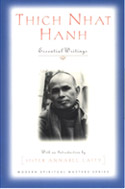Books |
Thich Nhat Hanh: Essential Writings
By
Published: Dec 18, 2012
Category:
Spirituality
Thich Nhat Hanh doesn’t use a telephone, so when I interviewed him for America Online, I had to pick him up and drive him to the office. TNH practices “walking meditation.” That is, he walks very slowly, breathing very consciously, so that every breath and step become prayers. I knew this. And walked very slowly. But not slowly enough. Every ten paces, I had to stop and go back.
That is not because I am a speedwalker, but because I’m not truly mindful. My loss. For as TNH points out:
The Buddha confirmed that it is possible to live happily in the here and the now — even if you still have lots of pain and sorrow within yourself. Mindful breathing helps you become fully alive. And when you are really there, you can touch all the wonders of life that are available in this very moment for your enjoyment…for your nourishment…and for your healing.
This is a very happy man presenting a joyous view of life. You think Buddhism is nihilistic because it lacks a God-figure and does not offer a roadmap to eternal life? Well, listen to this:
This body is not me. I am much more than this body. The space of 50 or 60 or 70 years is not my lifespan. It is not true that I did not exist before I was born. It is not true that I will no longer exist after the disintegration of this body. My ground of being is the reality of no birth, no death. No coming, no going. It is like water is the ground of being of a wave. The wave might be afraid of being or non-being. But if she knows that she is water, she will lose all her fear. Nothing is born…nothing dies. Birth and death cannot really touch us. If you know that, you will be able to enjoy every second of your daily life — even if you are in terminal illness.
I take great comfort in those words. And in the notion that meditation can be as simple as a conscious in-breath, a conscious out-breath. And that the key to everything is to be wide-awake — to be “mindful.” [To buy the paperback of “Essential Writings” from Amazon, click here. For the Kindle edition, click here.]
Who is Thich Nhat Hahn? He became a monk in Vietnam at 16. He studied Zen (no, Zen is not just a Japanese strain of Buddhism), but in an “engaged” form, so, in the early 1960s, he founded the School of Youth for Social Services — a Vietnamese Peace Corps — to help his war-battered countrymen. A university and a magazine followed.
In 1966, TNN’s non-violent appeals caused him to be exiled from Vietnam. He taught at Columbia University, then founded a retreat in rural France called Plum Village. Now he comes to America about once a year and gives lectures in a voice so quiet and peaceful you have to lean in to hear him.
His themes resonate deeply for me:
Do not be bound to any doctrine, theory, or ideology, even Buddhist ones… Avoid being narrow-minded… Truth is found in life and not merely in conceptual knowledge…. Do not force others to adopt your views… Do not avoid contact with suffering…. Do not maintain anger or hatred… Do not live with a vocation that is harmful to humans and nature.
Dreamer? TNH is the ultimate realist. “Do not believe that I feel that I follow these precepts perfectly,” he says. “I know I fail in many ways. However, I must work toward a goal. These are my goals. No words can replace practice, only practice can make the words.”
It has long been clear to me that this peace starts with the personal — before I can help others create peace, I must be at peace within myself. Over time, I have found that TNH is the teacher who best helps me do this. Maybe you will find that to be true for you as well.
TNH is prolific. Where to start? Easy: a 163-page paperback, “The Essential Writings.”


